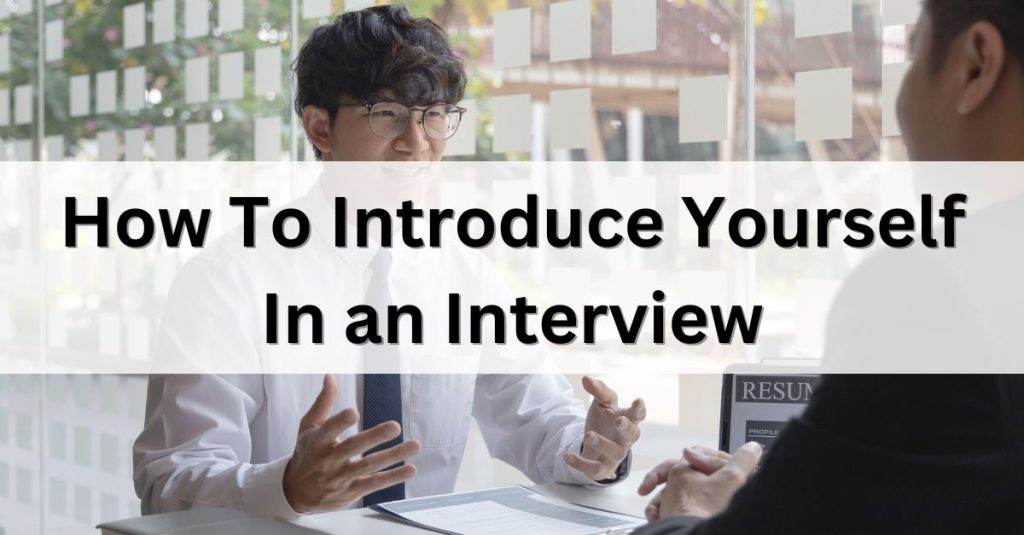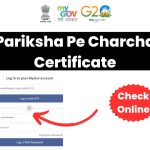How To Introduce Yourself: Has it been a long wait to get that dream job? A job interview is a valuable moment for any job seeker and the thought of messing up the only chance you have of getting one step closer to the job of your dreams is equally horrifying.
Suitably introducing yourself can actually decide your chances of getting hired by the company. So, here I have curated the best practices of planning, introducing, things to remember, and what you can do before, after, and through to ace that one interview you’ve been waiting for.

Planning Ahead is the Key!
Get things sleek on your big day and avoid going blank when questions are actually put up in front of you. It’s better to go prepared than go empty-headed and have no clue about what to answer next and how.
Here are some of the essential points to work on and plan for your upcoming interview:
- Read and understand the job role – It is the foremost thing you need to do before setting up your expectations too high or too low. Be keen about understanding what kind of work you will be bestowed with.
- Research the job role – Do good research on the job profile and get familiar with the role you aspire to and how well it goes with your aspirations.
- Key Skills – Go familiarise yourself with the key skills which you’ll be in need of, to bag that job and whether they go along with all the skills you have gathered over the years or does the job requires a skill with which you are still not familiar. If you got those skills all matched up, good for you! But if that isn’t the case, this is where planning will help you as you might still have got some time to polish those skills right on time when you need them.
- Research about the company – Research before an interview is very crucial as it exhibits your attitude towards the company and works as a whole. It is necessary as well as important to know about the values that the company holds, the work environment and the ethics of the company to make the final decision to join and work with them. Also, researching well about the company will help you answer the questions put forward on the interview day, which are related to the company or the work it does.
- Prepare and Practice your introduction in advance- Practice your interview just enough, to make you more confident about what you exactly want to say and what you actually need to express rather than unknowingly humming without a clue.

Below is an example of a self-introduction which you can conveniently use for your next big upcoming interview:
How To Introduce Yourself In an Interview
Introducing yourself is the first and the most important step to let the interviewer know about you and pave the path for the further questions that the interviewer really wants to ask, to test the knowledge which you’re required to have. The self-introduction is dynamic for each one of us and can be manipulated accordingly. Conveniently, I have presented it in steps. So, you can use it before any important interview.
Work From Home Jobs Without Investment
Introduction for Freshers
- Start by greeting and being genuinely thankful, saying, “First of all, thank you for shortlisting me for the interview and giving me the opportunity to introduce myself”.
- “My name is (Your Name). I belong to (the state or the city you are from)”.
- “I have graduated/post graduated (your highest qualification) from (XYZ) college with (your subject) as my major subject”.
- “As a part of my curriculum, I’ve acquired skills (your skills)”. Also, you may include any special achievements you possess which make you eligible for the job position (You can include any of your internships pertinent to the job profile you’re applying for).
- “I am a much disciplined individual and creative in my approach but I am also very attentive to detail-oriented”. In this step, you can describe a bit (do not extend and stress much) the positive and the negative aspects of your personality, not necessarily presenting the negative element in a way that it attributes to be a really negative quality.
- “In my spare time, I like (your hobbies).
- At last, you can say “It will be a great learning experience if I’m given the opportunity to work here because I aspire to grow in this industry and build my career in the same. Also, I’m willing to acquire the necessary skills required for my growth”. (It is important for the interviewer to know your approach towards the job and how willing are you to grow in the industry and the job role you’re applying for).
Introduction for Experienced
Experienced candidates can actually start by showcasing their work achievements first, instead of education. For example:
“I’ve been working for 4 years, as a project lead of XYZ Company/ Institution”.
“Through the years I have acquired skills in leadership, communication, team management, critical thinking and task management”.
“I’m now looking forward to enhancing my skills and work as a project manager”.
Further, you can continue with the rest, in a similar way as explained above.
Career Mistakes that a Job Seeker Should Avoid
Points to Remember on the Day of the Interview
- Take notes – you can take a glance at these notes to ask questions at the end when the interviewer finishes up with his questions. This will showcase your alertness and interest during the whole interview and your zeal to learn new things.
- Avoid interrupting the interviewer – do not be in a hurry to answer before the interviewer completes framing the question. Let him complete the sentence and then try answering the question put forward to you. If required, take a moment to respond and give the best probable answer to the question put forward. It’s better to take a moment than to answer something foolish enough to get you rejected at once.
- Dress appropriately – “You have to dress for the job you want, not the job you have,” says, Austin Kleon. To know what to wear for the interview, you need to research well the usual dress codes of the other employees and the work culture of the company. For a formal workplace, the dress code may be more formal than in any technology startup company. If still in doubt, always reach out to the company’s office and contact them before the interview. So, you can be sure about how you dress up.
- Avoid getting distracted – It is impressive if you maintain direct eye contact with the interviewer because if you want people to be engrossed in the conversation with you, you need to pay equal attention to them as well.
- Maintain your body posture – Body language also plays a major role as it does leave an influence on the interviewer. Maintaining a straight posture, resting your hands folded on the lap and feet on the floor or folding them at the ankles is perfect.
- Be authentic – It is very likely that the interviewer has already heard all the probable answers and is not interested in hearing the same sentences all over again. So, what an interviewer wants to know is who you are in actuality. Be yourself! Your qualification does matter but they will also ensure whether or not you’ll have a good cultural impact on the institution and you are effortless to work with.
- Be polite – You don’t want to scare away people with the pitch of your voice. Be clear with your statement and loud, just enough to be audible. There’s no need to be shouting out what all you got.
- Be Confident and greet everyone with a smile – It is one of the basic etiquettes, to greet everyone with a smile.
- Be Concise – You need not stretch the answers to the extent that the interviewer loses interest in giving an ear to you.
Interview Day
- Stand up as the interviewer enters, shake hands and wait for them to get settled. This is another basic etiquette.
- Start and greet by saying your name and genuinely express how pleased are you to meet them. For example: “Hello, I’m (your name). Pleased to meet you”.
- Hand over the resume to the interviewer. Let him go through it and when it’s done. This is when you will start to actually introduce yourself in a systematic way.
Top 20+ Highest Paying Jobs in India: Check Top Paying Careers
After Finishing the Interview
Follow the lead of the interviewer, smile, shake hands and close the conversation by saying: “It was an immense delight to meet you. Thank you for the opportunity. I hope to hear from you soon”.
The next thing you need to do is to prepare a follow-up email to elevate your chances of getting hired. It is basically an email you send to your interviewer to thank him for giving you the opportunity to be considered for the post. Send this mail after 2-3 days of your interview.
I hope this article will be an immense help to you, for your upcoming interviews.






